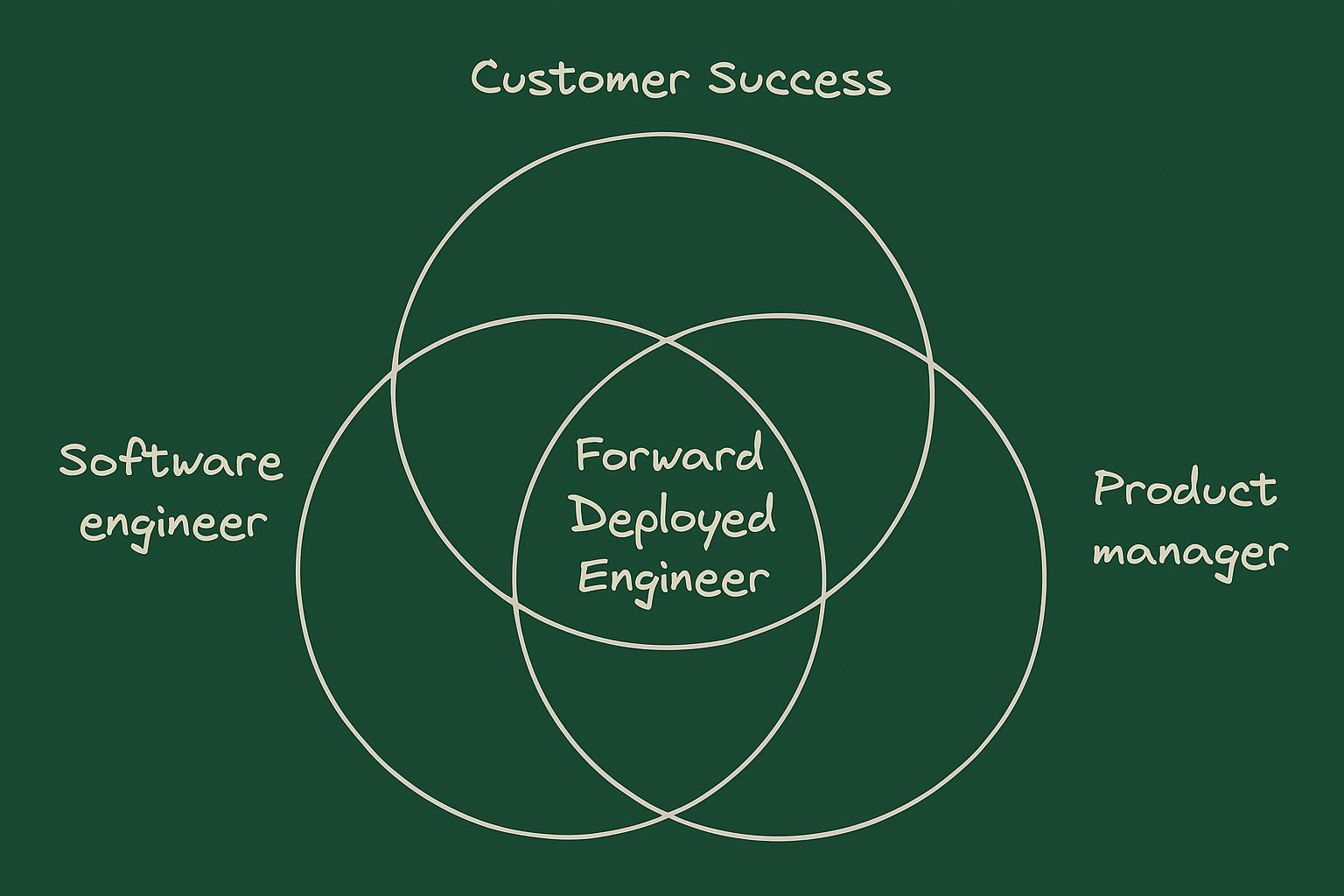
Forward deployed engineers are quietly becoming one of the most valuable roles in tech. They’re dangerous in the best way, and the demand for them is only getting started.
TLDR
What Is a Forward Deployed Engineer?
A forward deployed engineer (FDE) is a technical expert who works directly with customers, writing and debugging code alongside them and quickly turning feedback into real-world product improvements.
They often travel to meet customers in person, building a deep understanding of their workflows and challenges.
FDE then communicates these insights back to the core team, helping shape the product roadmap.
The role mixes three main skills. First, technical ability - you need to build, debug, and adapt. Second, customer skills - you need to listen, explain, and solve problems in real time. The third is arguably the most important - entrepreneurial drive - you need to figure stuff out on the fly and just make stuff happen. Nonstop execution.
Must-Haves vs Nice-to-Haves
Must-haves:
- Strong coding skills
- Clear communication
- Problem solving in live environments
- Comfort with ambiguity
Nice-to-haves:
- Domain knowledge in a specific industry
- Sales engineering background
- Prior startup experience
- Ability to prototype quickly
This mix is rare. That’s why demand is spiking.
Acting as the Bridge
Most companies today need someone who can translate between the customer and the core team. That’s the FDE. They hear the pain points in the field, then bring them back in a way that shapes product.
In many ways, the FDE becomes the glue between engineering, product, and customer success.
Heres an example: a FDE at a healthcare startup might debug API issues in the morning, sit with a doctor in the afternoon, then ship a quick prototype by night.
The Market Shift
Why is this role so hot right now? Because the market is shifting. The bottleneck used to be building the tech. Now, it’s distribution.
With AI, building tools is faster than ever. Anyone can spin up a demo in days/weeks. The challenge is getting that tool into real workflows, scaling it, and making sure customers succeed. That’s where FDEs come in.
WebProNews even pointed out that forward deployed engineers are driving AI adoption in 2025 here. The people on the ground, who can both code and communicate, are the ones turning demos into revenue.
Why Distribution Matters
If you look at startups today, many fail not because the product doesn’t work. They fail because customers don’t use it, or churn out fast. Distribution is about trust, integration, and workflow fit.
An FDE can walk into that gap. They can set up systems, adapt features, and keep customers moving forward. That’s a huge edge for any company trying to scale.
In short, distribution is the battlefield. FDEs are the frontline.
Career Path Angle
One of the best things about being an FDE is the career path. You pick up skills that few other roles give you all at once.
FDEs often grow into product managers, since they live at the customer interface.
They also move into technical leadership, since they’ve already handled messy real-world systems under pressure.
And many go on to become founders - because they’ve already been tested in chaotic, high-stakes environments, they bring instincts other roles rarely teach.
The Future Angle
Looking forward, I don’t see demand slowing down. AI adoption is still early, and the number of startups is exploding. Every one of those startups needs to bridge product and customer.
We’re already seeing this in sectors like healthcare, climate tech, and finance. The tech is powerful, but the workflows can be complex or messy. Churn is at an all time high and likely only going to get worse. Businesses that deploy their staff to the field will have a huge advantage.
In ten years, the best founders and leaders may be people who once worked as FDEs. They’ll have the customer instincts and the technical chops to build companies people actually use.
Why This Moment Matters
The rise of FDEs is tied to the wider shift in tech. As tools get easier to build, the hard part becomes adoption. As products flood the market, the winners will be the ones that actually get distributed and embedded into workflows.
That’s why forward deployed engineers are so important. They represent a mindset as much as a job. They move fast, they listen, they build, and they adapt.
In the past, the best startups had great engineers. In the future, the best startups will of course have great engineers, but also have excellent forward deployed engineers.
Closing Thoughts
I think this role will only grow in relevance. It combines the grit of a founder, the skills of an engineer, and the empathy of customer success. Few jobs offer that mix.
For anyone looking to break into startups, it’s one of the best roles you can take. For companies, it might be the most important hire you make this year.
The truth is simple: distribution is key, and forward deployed engineers are the ones carrying the torch. The demand for this role is real, and the opportunity is massive.